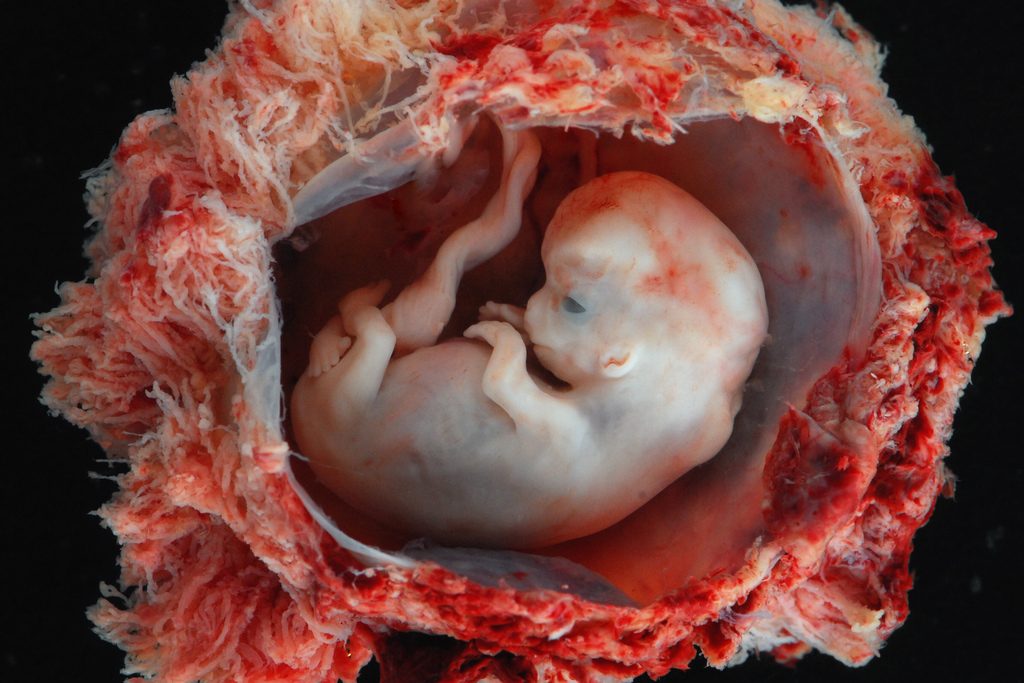Science has proven that a fetus can feel pain — and research shows that it may be even earlier than 20 weeks, as doctors have testified.
In 2005, Dr. Jean Wright, a professor of pediatrics at the Mercer School of Medicine, addressed the House Subcommittee of the Constitution regarding the Unborn Child Pain Awareness Act. She told the subcommittee:
[…] we no longer speculate as to whether they [premature infants] feel pain. We understand it, try to avoid it and treat it when appropriate. […] This standard exists for children born; now we raise the standard and ask that it exist for those unborn. “Will this surgery or procedure on my premature baby cause pain? What will be done to alleviate the pain and suffering?’ We should answer those questions as clearly for procedures concerning the unborn as the born.
At the same hearing, Dr. K.S. Anand, professor of pediatrics, anesthesiology, pharmacology, and neurobiology at the University of Arkansas College of Medicine, told the subcommittee that studies claiming that preborn humans are unlikely to feel pain before 30 weeks gestation are outdated and use suspect methodology.
In 2012, Dr. Colleen Malloy, assistant professor of pediatrics at Northwestern University Feinberg School of Medicine, testified at a hearing for the District of Columbia Pain-Capable Unborn Child Protection Act. Dr. Malloy’s testimony is vital as it shows that abortion not only takes the life of a child but tortures that child. Dr. Malloy treats infants born at 22 weeks gestation (20 weeks post-fertilization) and comes to the critical conclusion:
As we provide care for all of these survivors, we are able to witness their experiences with pain. In fact, standard of care for neonatal intensive care units requres attention to and treatment of neonatal pain. There is no reason to believe that a born infant would feel pain any differently than that same infant were he or she still in utero. Thus, the difference between fetal and neonatal pain is simply the locale in which the pain occurs. The receiver’s experience of the pain is the same. I could never imagine subjecting my tiny patients to horrific procedures such as those that involve limb detachment or cardiac injection [in abortion].
Dr. Malloy goes on to state that not only do fetuses at this stage feel pain but that they have a “heightened sensation of pain compared to an infant more advanced in gestation.” Former abortionist Dr. Anthony Levatino explains a late-term abortion in this video:
“I firmly believe, as the evidence shows, that the fetal pain experience is no less than the neonatal or adult pain experience,” stated Dr. Malloy. “It may even be greater than that which you or I would experience from dismemberment or other physical injury.”
Five years later, in April 2017, Maureen Condic, Ph.D., an associate professor of Neurobiology and Anatomy at the University of Utah, testified before Congress, updating them on new information regarding fetal pain. She informed them:
[…] the overall organization of the nervous system is established by four weeks. This is significant because it shows that even at this early stage, the brain is not anything like a mere collection of cells or a ‘blank slate’ to be written upon by later developmental processes. Like all embryonic organs, the structure of the early brain ‘anticipates’ the function of the mature system.
Dr. Condic said preborn children have a capacity to feel pain very early in their development, noting that the “neural circuitry responsible for the most primitive response to pain, the spinal reflex, is in place by eight weeks of development.” At that point, a fetus responds to the pain by recoiling from the stimuli as witnessed in The Silent Scream. By eight to ten weeks, Condic said, many of the neural connections are formed. By 12-18 weeks the spino-thalamic pathways are established and the fetus is “capable of mature pain perception.” She added:
It is entirely uncontested in the scientific and medical literature that a fetus experiences pain in some capacity from as early as eight weeks and most modern neuroscientists conclude that the thalamic circuitry that’s in place by 18 weeks post-fertilization is primarily responsible for human experience of pain at all stages of life.
READ: Research now shows that preborn babies can feel pain very early – by 8 weeks
Another point Dr. Condic makes in her testimony is that stress hormones are a response to pain and are seen in preborn humans.
“Pain response observations are very precise and they’re based on objective criteria,” she said. “Strikingly, the earlier fetuses are delivered the stronger their response to pain, and this is due to the absence of later arising brain circuitry that actually inhibits the pain response in older infants and in adults.”
Dr. Condic noted that the information claiming that fetuses are not capable of pain — put out by the American College of Obstetricians and Gynecologists, the Royal College of Obstetricians and Gynecologists, and the Journal of American Medical Association — received widespread scientific criticism because these organizations didn’t show any evidence to back up their claims.
“The debate over fetal pain is not whether pain is detected by a fetus at 20 weeks,” she said. “There’s essentially universal agreement on this point in the scientific community. Rather the debate concerns how pain is experienced. Whether a fetus has the same pain experience as a newborn or adult.”
Scientific evidence clearly shows that fetuses are capable of pain from early on in their development, earlier than we ever thought before. In fact, it wasn’t long ago that doctors believed newborns to be incapable of pain. As late as 2015, scientists were still discovering that an infant’s brain is much more developed than they had previously believed.
Knowing that infants feel pain, that premature babies feel pain, and that fetuses feel pain, it is vital to change our abortion laws. As a country that views itself as a champion of human rights in modern civilization, the United States should be leading the way in banning the torture and abortion of preborn humans.
“We must consider our own experience and ask what kind of a society we want to be,” said Dr. Condic. “[…] Imposing pain on any pain-capable living creature is cruelty, and ignoring the pain experienced by another human for any reason is barbaric. We don’t need to know if a fetus experiences pain precisely in the same way we do; we simply have to decide whether we’re going to choose to ignore the pain of the fetus or not. […] Given that fetuses are members of the human species — human beings like us — they deserve the benefit of the doubt regarding their experience of pain and protection from cruelty under the law.”







